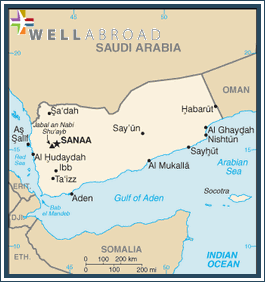|
MOST RECENT ALERTS
There's no recent alert.
|

|
|||||||||||||||
| COUNTRY OVERVIEW | ||||||||||||||||
|---|---|---|---|---|---|---|---|---|---|---|---|---|---|---|---|---|
|
| COUNTRY GENERAL INFORMATION | |||||||
|---|---|---|---|---|---|---|---|
| Language: |
Arabic |
||||||
| Currency: | Yemeni rial (YER) | ||||||
| Predominant Religions: |
Muslim including Shaf'i (Sunni) and Zaydi (Shi'a), small numbers of Jewish, Christian, and Hindu |
||||||
| National Holidays: | Unification Day, 22 May (1990) | ||||||
| Economic Status: |
Yemen, one of the poorest countries in the Arab world, reported average annual growth in the range of 3-4% from 2000 through 2007. Its economic fortunes depend mostly on declining oil resources, but the country is trying to diversify its earnings. |
||||||
| Security: |
|
||||||
| US Presence: | |||||||
| Document Requirements: |
Passports and visas are required for travel to Yemen. Visas may be obtained at Yemeni Embassies abroad; all travelers to Yemen can also potentially obtain entry visas at ports of entry. Travelers to Yemen are no longer required to have an affiliation with and arrange their travel through a Yemeni-based individual or organization to enter Yemen. However, individuals may be asked for supporting evidence of their character, purpose of visit and length of stay. Upon arrival at ports of entry, travelers may be issued a visa valid for a maximum of three months. Yemeni law requires that all foreigners traveling in Yemen obtain exit visas before leaving the country. In cases of travelers with valid tourist visas and without any special circumstances (like those listed below), this exit visa is obtained automatically at the port of exit as long as the traveler has not overstayed the terms of the visa. In certain situations, however, foreigners are required to obtain exit visas from the Immigration and Passport Authority headquarters in Sanaa. These cases may include, but are not limited to, foreigners who have overstayed the validity date of their visa; U.S.-citizen children with Yemeni or Yemeni-American parents who are not exiting Yemen with them; foreigners who have lost the passport containing their entry visa; foreign residents whose residence visas are based on their employment or study in Yemen, marriage to a Yemeni citizen, or relationship to a Yemeni parent; or foreign residents who have pending legal action (including court-based "holds" on family members' travel). The loss of a passport can result in considerable delay to a traveler because Yemeni law requires that the traveler attempt to recover the passport by placing an advertisement in a newspaper and waiting three days for a response. All minor/underage U.S. citizens should be accompanied by their legal guardian(s) and/or provide a notarized letter in Arabic of parental consent when obtaining exit visas to depart Yemen. In all of these more complex cases, obtaining an exit visa requires the permission of the employing company, the sponsoring Yemeni family member, the sponsoring school or the court in which the legal action is pending. Without this permission, foreigners -- including U.S. Citizens -- may not be allowed to leave Yemen. For more details, travelers can contact the Embassy of the Republic of Yemen, Suite 705, 2600 Virginia Avenue NW, Washington, DC 20037, telephone 202-965-4760; or the Yemeni Mission to the U.N., 866 United Nations Plaza, Room 435, New York, NY 10017, telephone (212) 355-1730. Visit the Yemeni Embassy web page for more visa information. Information about dual nationality or the prevention of international child abduction can be found on our web site. For further information about customs regulations, please read our Customs Information sheet. |
||||||
| Major Airports: |
Aden International Airport (ADE/OYAA) |
||||||
| Servicing Airlines: |
|
||||||
| Risks and Precautions: |
US Dept. of State Travel Warning Updated October 15, 2010 http://travel.state.gov/travel/cis_pa_tw/tw/tw_936.html |
||||||
| Mortality Statistics: |
Infant MR total: 56.27 deaths/1,000 live births |
||||||
| Immunization Indicators: |
Required: None |
||||||
| Infectious Disease Concerns: |
Drugs to Prevent Malaria (antimalarial drugs) |
||||||
| Overall Quality of Medical Services: |
Lack of modern medical facilities outside of Sana'a and Aden and a shortage of emergency ambulance services throughout the country may cause concern to some visitors. Doctors and hospitals often expect immediate cash payment for health services. An adequate supply of prescription medications for the duration of the trip is important. While many prescription drugs are available in Yemen, a particular drug needed by a visitor may not be available. |
||||||
| Providers in Network: |
|
||||||
| Recent Medical Threats/ Concerns/Warnings: |
Schistosomiasis has been found in focal areas in Iraq, Saudi Arabia, Syria, and Yemen. To prevent schistosomiasis, do not swim in fresh water (except in well-chlorinated pools) in these countries. (For more information, please see Swimming and Recreational Water Safety.) Measles continues to reported from the region. An outbreak of polio occurred in Yemen in 2005 following importation of poliovirus from Nigeria. Highly pathogenic avian influenza (H5N1) has been found in poultry populations in the Middle Eastern region. Avoid all direct contact with birds, including domestic poultry (such as chickens and ducks) and wild birds, and avoid places such as poultry farms and bird markets where live birds are raised or kept. For a current list of countries reporting outbreaks of H5N1 among poultry and/or wild birds, view updates from the World Organization for Animal Health (OIE), and for total numbers of confirmed human cases of H5N1 virus by country see the World Health Organization (WHO) Avian Influenza website. |
||||||
| Communications Info: |
Country Code: +967 |
||||||






